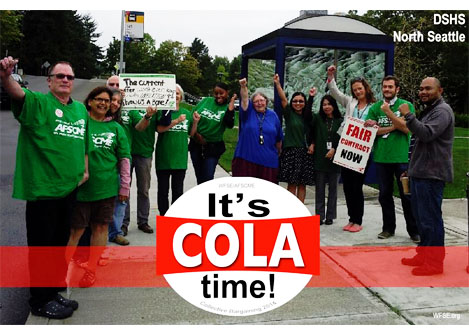OPINION
Fund state employees’ contracts, fix our structural budget deficit
By DENNIS EAGLE
(Jan. 15, 2015) — The Washington Federation of State Employees, AFSCME Council 28 applauds Gov. Jay Inslee for including the funding for all state employee collective bargaining agreements in his budget, and we urge the Legislature to do the same.
During the Great Recession, the state budget was balanced in large part by making billions of dollars in cuts to public employees. Our salaries were reduced and our benefits were cut. Thousands of jobs were lost. There hasn’t been a pay raise for state employees since 2008, the longest stretch in more than 50 years. One estimate is that state employees have lost 15% of their purchasing power over the previous three biennia.
 The contracts that have been negotiated include modest pay raises that don’t come anywhere close to making up for what has been taken away. But it’s something, and it’s incredibly important to the men and women who serve the public every day. To think the state could go on in perpetuity without paying the people who actually provide the services would be a very bad business decision and a disservice to the taxpayers.
The contracts that have been negotiated include modest pay raises that don’t come anywhere close to making up for what has been taken away. But it’s something, and it’s incredibly important to the men and women who serve the public every day. To think the state could go on in perpetuity without paying the people who actually provide the services would be a very bad business decision and a disservice to the taxpayers.
Ratifying the collective bargaining agreements is simply the right thing to do.
Speaking to the larger budget, Washington state is in trouble. Again. And we’re going to continue to lurch from crisis to crisis for the foreseeable future because Washington has a structural budget deficit. State revenue as a percent of the overall economy is dropping and will continue to drop. Meanwhile, economic growth, population and demand for services are all growing. We all know these things to be true.
Some will argue there’s no need for more revenue because there has been some revenue growth over the current biennium. That’s like saying we shouldn’t worry about a $300 rent increase because our wages went up $100. That rationale ignores the growth in population and demand, predictable increases in costs, court-mandated spending increases in K-12, mental health, and the Children’s Administration, and voter-approved demands for class size reductions.
If we follow that path we will be back here in two years talking about yet another budget crisis.
We need a permanent realignment of revenue to spending, and there are only two ways to do that: reduce spending or increase revenue. And there are an infinite number of possible solutions between those two extremes. But if we’re going to reduce spending, we need to be clear with the public and tell them what it is we’re not going to do any more. The state of Washington deserves an honest discussion about what we can and can’t afford, not unspecified administrative efficiencies, across the board cuts, or gimmicks.
Some will also argue that we simply need to prioritize, to fund education first, and let the chips fall where they may. We believe that would absolutely result in budget cuts to human services, public safety, higher education and natural resources. For advocates of a smaller government that may sound like a good idea. But again, proponents of this approach need to be up front, and tell us what services will no longer be provided. We can no longer take the position that we can do everything we’re doing now with less money.
The state of Washington needs a permanent fix to its budget, and the public deserves a forthright debate. We don’t think it can be done without new revenue. The service cuts that would be required would simply be unacceptable to most Washingtonians.
Do we really want to live in a state where at-risk children are ignored, where the mentally ill are strapped to gurneys in hospital hallways, where higher education is no longer an option for the middle class, where our education funding per-student is among the lowest in the nation?
We believe the Legislature is going to have to bite the bullet and raise revenue somehow, and the next question is whether or not those revenue increases are fair.
We hear some are saying the Governor’s revenue proposals — primarily based on a capital gains tax and a carbon tax — are dead on arrival. But our question is if not that, then what? Are we going to make the middle class pay more, by increasing gas taxes, sales taxes or B&O taxes on small business, or we going to ask the wealthy and the powerful to sacrifice along with the rest of us? Public servants have already sacrificed. A lot. And we may never recover what we’ve lost over the past seven years.
But the state of Washington deserves a permanent solution to our perpetual budget crisis. We believe the structural budget deficit can’t be solved without new revenue, and we strongly believe there are revenue solutions that don’t involve sticking it to the middle class.
 We urge the Legislature to act both responsibly and fairly.
We urge the Legislature to act both responsibly and fairly.
Dennis Eagle is the Director of Legislative and Political Action for the Washington Federation of State Employees, AFSCME Council 28 (WFSE). These remarks were delivered Jan. 14, 2015, at a press event announcing the 2015 Shared Prosperity Agenda of the Washington State Labor Council, its affiliated unions, and community partners.





